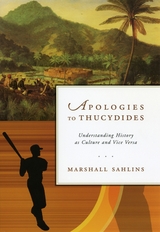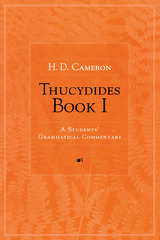7 books about History of the Peloponnesian War

Apologies to Thucydides
Understanding History as Culture and Vice Versa
Marshall Sahlins
University of Chicago Press, 2004
Thucydides' classic work on the history of the Peloponnesian War is the root of Western conceptions of history—including the idea that Western history is the foundation of everyone else's. Here, Marshall Sahlins takes on Thucydides and the conceptions of history he wrought with a groundbreaking new book that shows what a difference an anthropological concept of culture can make to the writing of history.
Sahlins begins by confronting Thucydides' account of the Peloponnesian War with an analogous "Polynesian War," the fight for the domination of the Fiji Islands (1843-55) between a great sea power (like Athens) and a great land power (like Sparta). Sahlins draws parallels between the conflicts with an eye to their respective systems of power and sovereignty as well as to Thucydides' alternation between individual (Pericles, Themistocles) and collective (the Athenians, the Spartans) actors in the making of history. Characteristic of most histories ever written, this alternation between the agency of "Great Men" and collective entities leads Sahlins to a series of incisive analyses ranging in subject matter from Bobby Thomson's "shot heard round the world" for the 1951 Giants to the history-making of Napoleon and certain divine kings to the brouhaha over Elián Gonzalez. Finally, again departing from Thucydides, Sahlins considers the relationship between cultural order and historical contingency through the recounting of a certain royal assassination that changed the course of Fijian history, a story of fratricide and war worthy of Shakespeare.
In this most convincing presentation yet of his influential theory of culture, Sahlins experiments with techniques for mixing rich narrative with cultural explication in the hope of doing justice at once to the actions of persons and the customs of people. And he demonstrates the necessity of taking culture into account in the creation of history—with apologies to Thucydides, who too often did not.
Sahlins begins by confronting Thucydides' account of the Peloponnesian War with an analogous "Polynesian War," the fight for the domination of the Fiji Islands (1843-55) between a great sea power (like Athens) and a great land power (like Sparta). Sahlins draws parallels between the conflicts with an eye to their respective systems of power and sovereignty as well as to Thucydides' alternation between individual (Pericles, Themistocles) and collective (the Athenians, the Spartans) actors in the making of history. Characteristic of most histories ever written, this alternation between the agency of "Great Men" and collective entities leads Sahlins to a series of incisive analyses ranging in subject matter from Bobby Thomson's "shot heard round the world" for the 1951 Giants to the history-making of Napoleon and certain divine kings to the brouhaha over Elián Gonzalez. Finally, again departing from Thucydides, Sahlins considers the relationship between cultural order and historical contingency through the recounting of a certain royal assassination that changed the course of Fijian history, a story of fratricide and war worthy of Shakespeare.
In this most convincing presentation yet of his influential theory of culture, Sahlins experiments with techniques for mixing rich narrative with cultural explication in the hope of doing justice at once to the actions of persons and the customs of people. And he demonstrates the necessity of taking culture into account in the creation of history—with apologies to Thucydides, who too often did not.
[more]

Chance and Intelligence in Thucydides
Lowell Edmunds
Harvard University Press, 1975

A Historical Commentary on Thucydides
A Companion to Rex Warner's Penguin Translation
David Cartwright
University of Michigan Press, 1997
Much of the modern way of thinking about history and historiography in fact begins with the great Greek historian Thucydides, an Athenian general in the latter half of the fifth century b.c.e. It is also Thucydides who provides us with the historical framework for fifth-century Greece, a period of progress and creativity rarely equaled in human history. His work, The Peloponnesian War, recounts that destructive conflict and also includes the only surviving contemporary record of the rise of the Athenian empire. Thucydides teaches his readers that the most powerful states in the world can come to a humiliating end, that a careless tyranny, especially toward the weak, and, nearly two millennia before Machiavelli, that absolute power corrupts absolutely.
In A Historical Commentary on Thucydides, David Cartwright aims to guide the Greekless reader through Thucydides' fascinating yet demanding narrative. Cartwright's is the only such full-length, one-volume commentary and companion: it is based on Rex Warner's Penguin translation of Thucydides--the most widely used translation--and requires no knowledge of Greek. The introduction to A Historical Commentary on Thucydides includes a brief biography of Thucydides: his approach, aims, and methods are discussed, as are the general character of his work and his contribution to historiography. The commentary gives brief accounts of the people and places mentioned by Thucydides and puts events in their immediate and wider contexts. Cartwright provides occasional summaries, explains Greek concepts and technical terms, and offers interpretations of difficult or controversial passages. The author also picks out important historiographical issues and discusses the themes' underlying events.
For both first-time readers and seasoned students, this commentary gives broad access to one of antiquity's most profound and difficult writers. Historians, classicists, and anyone else interested in the cultural and intellectual achievements of ancient Greece will find A Historical Commentary on Thucydides a welcome addition to their library.
David Cartwright is Head of Classics at Dulwich College, London, England.
In A Historical Commentary on Thucydides, David Cartwright aims to guide the Greekless reader through Thucydides' fascinating yet demanding narrative. Cartwright's is the only such full-length, one-volume commentary and companion: it is based on Rex Warner's Penguin translation of Thucydides--the most widely used translation--and requires no knowledge of Greek. The introduction to A Historical Commentary on Thucydides includes a brief biography of Thucydides: his approach, aims, and methods are discussed, as are the general character of his work and his contribution to historiography. The commentary gives brief accounts of the people and places mentioned by Thucydides and puts events in their immediate and wider contexts. Cartwright provides occasional summaries, explains Greek concepts and technical terms, and offers interpretations of difficult or controversial passages. The author also picks out important historiographical issues and discusses the themes' underlying events.
For both first-time readers and seasoned students, this commentary gives broad access to one of antiquity's most profound and difficult writers. Historians, classicists, and anyone else interested in the cultural and intellectual achievements of ancient Greece will find A Historical Commentary on Thucydides a welcome addition to their library.
David Cartwright is Head of Classics at Dulwich College, London, England.
[more]

READING THUCYDIDES
JAMES V MORRISON
The Ohio State University Press, 2006

Speaking the Same Language
Speech and Audience in Thucydides' Spartan Debates
Paula Debnar
University of Michigan Press, 2002
The Peloponnesian War, which destroyed imperial Athens and ultimately Sparta as well, continues to fascinate students of history, politics, and human nature. Thucydides' account of the twenty-seven-year conflict charts the opposition between the two great powers of the classical Greek world and the ways of life they represented. Paula Debnar explores the collapse of these powers from a new perspective, examining the ways discourse changed under the strain of a long and costly war.
Speaking the Same Language seeks to recover the role played by the audiences within the History. By restoring the internal audiences to a more prominent place, Debnar emphasizes the perspective of the participants in the war and heightens the dramatic immediacy of the debates. She thoroughly analyzes twelve speeches delivered by or to the Spartans, demonstrating how the earlier speeches illustrate the role of discourse in the construction of Sparta's identity and the unification of her Dorian allies in the face of their primarily Ionian adversaries.
Combining close textual analysis with an examination of narrative and historical context, Debnar bridges the gap between literary and historical studies of Thucydides. Accessible to specialists and nonspecialists alike, her work will interest those working in the fields of Greek literature, ancient historiography, rhetoric, political science, and ethnic studies.
Paula Debnar is Associate Professor of Classics, Mount Holyoke College.
Speaking the Same Language seeks to recover the role played by the audiences within the History. By restoring the internal audiences to a more prominent place, Debnar emphasizes the perspective of the participants in the war and heightens the dramatic immediacy of the debates. She thoroughly analyzes twelve speeches delivered by or to the Spartans, demonstrating how the earlier speeches illustrate the role of discourse in the construction of Sparta's identity and the unification of her Dorian allies in the face of their primarily Ionian adversaries.
Combining close textual analysis with an examination of narrative and historical context, Debnar bridges the gap between literary and historical studies of Thucydides. Accessible to specialists and nonspecialists alike, her work will interest those working in the fields of Greek literature, ancient historiography, rhetoric, political science, and ethnic studies.
Paula Debnar is Associate Professor of Classics, Mount Holyoke College.
[more]

Thucydides Book I
A Students' Grammatical Commentary
H. D. Cameron
University of Michigan Press, 2003
The first book of Thucydides is a compact masterpiece. Here he sets up the conditions that led to the outbreak of the Peloponnesian War in 431 B.C. With great economy, he analyzes the origins of large-scale wars; integrates a sketch of the historical background into the larger thematic threads of his narrative; presents a brief statement of his methods and goals; outlines a hierarchy of causation; develops a theory of character and human nature; and presents a theory of leadership, chance, and foresight, all within a narrative structure that perfectly focuses these elements.
Because Book I is not primarily historical narrative, it inevitably proves difficult for inexperienced readers. Despite the convolutions and density of Thucydides' prose style, no authoritative commentary has been published since the early days of the last century. H. D. Cameron is a renowned expert in Greek and comparative grammar and has written this handbook for all levels of classical students and scholars. His commentary authoritatively accounts for the last one hundred years of evolving grammatical and linguistic theory as they apply to the seminal work of Thucydides.
H. D. Cameron is Professor of Greek and Latin and Director of the Great Books Program at the University of Michigan.
Because Book I is not primarily historical narrative, it inevitably proves difficult for inexperienced readers. Despite the convolutions and density of Thucydides' prose style, no authoritative commentary has been published since the early days of the last century. H. D. Cameron is a renowned expert in Greek and comparative grammar and has written this handbook for all levels of classical students and scholars. His commentary authoritatively accounts for the last one hundred years of evolving grammatical and linguistic theory as they apply to the seminal work of Thucydides.
H. D. Cameron is Professor of Greek and Latin and Director of the Great Books Program at the University of Michigan.
[more]

Thucydides on the Nature of Power
A. Geoffrey Woodhead
Harvard University Press, 1970
The implications of Thucydides' hostility to full democracy have long been avoided by scholars. In this provocative study the author confronts and examines this aspect of Thucydides' thought in detail. A. Geoffrey Woodhead also discusses his controversial interpretation of Thucydides' view of the nature of power: that equally among states and individuals, the impulse toward power follows its own laws, which are not immoral but amoral, and which should be viewed for themselves without ethical or emotional confusion.
[more]
READERS
Browse our collection.
PUBLISHERS
See BiblioVault's publisher services.
STUDENT SERVICES
Files for college accessibility offices.
UChicago Accessibility Resources
home | accessibility | search | about | contact us
BiblioVault ® 2001 - 2024
The University of Chicago Press









